- Home
- Lynne Olson
Citizens of London Page 2
Citizens of London Read online
Page 2
With that simple gesture, the forty-five-year-old king made history. Never before had a British monarch abandoned royal protocol and ventured outside his palace to greet a newly arrived foreign envoy. Until the meeting at Windsor station, a new ambassador to Britain was expected to follow a minutely detailed ritual in presenting his credentials to the Court of St. James. Attired in elaborate court dress, he was taken in an ornate carriage, complete with coachman, footmen, and outriders, to Buckingham Palace in London. There he was received by the king in a private ceremony, usually held weeks after his arrival in the country.
But, on this blustery afternoon in March 1941, there was to be no such pomp or pageantry. As a throng of British and American reporters looked on, the king engaged the bareheaded Winant, wearing a rumpled navy blue overcoat and clutching a gray felt hat, in a brief, animated conversation. Then George VI led the ambassador to a waiting car for the drive to Windsor Castle and tea with the queen, followed by a ninety-minute meeting between the two men.
With the survival of Britain dangling by a thread, the king’s unprecedented gesture made clear that traditional court niceties were to be set aside, at least for the duration of the war. But more significantly, he was underscoring his country’s desperate need for U.S. assistance, along with its hope that Winant, unlike his defeatist-minded predecessor, Joseph P. Kennedy, would persuade his government that such aid was vital now.
Kennedy, a former Wall Street speculator and ex-chairman of the Securities and Exchange Commission, had closely aligned himself with the appeasement policies of the previous prime minister, Neville Chamberlain. During his three years in London, he had made no secret of his belief that “wars were bad for business, and what was worse, for his business,” as journalist James “Scotty” Reston put it. The U.S. ambassador believed this so firmly that he even used his official position to commandeer scarce cargo space on transatlantic ships for his own liquor export business. After Chamberlain and the French prime minister handed over much of Czechoslovakia to Adolf Hitler at Munich in September 1938, Kennedy remarked happily to Jan Masaryk, the Czechoslovak minister to Britain: “Isn’t it wonderful [that the crisis is over]? Now I can get to Palm Beach after all!”
In October 1940, at the height of German bombing raids on London and other parts of Britain, he returned home for good, declaring that “England is gone” and “I’m for appeasement one thousand per cent.” After meeting with President Roosevelt at the White House, he told reporters that he would “devote my efforts to what seems to me to be the greatest cause in the world today … to help the president keep the United States out of war.”
Kennedy’s outspoken desire to come to terms with Hitler had made his successor’s task all the more ticklish. Winant’s mission was, according to the New York Times, “one of the toughest and biggest jobs the President can give. He has to explain to a country that is daily being bombed why a country, safely 3,000 miles away … wants to help but will not fight. That is a difficult thing to tell a person whose home has just been wrecked by a bomb.”
On the morning of March 1, shortly after the Senate approved his nomination, the fifty-one-year-old Winant arrived at an airfield near the southern port of Bristol, which had suffered a severe battering by the Luftwaffe just a few weeks earlier. Before being whisked off to a special royal train for his journey to Windsor, the new ambassador wasted no time in demonstrating that he was not Joe Kennedy. Asked by a BBC reporter to say a few words to the British people, he paused a moment, then said quietly into the microphone, “I’m very glad to be here. There is no place I’d rather be at this time than in England.”
The following day, his remark was on the front pages of most British newspapers. The Times of London, evidently considering the remark a good omen, waxed uncharacteristically poetic when it reported that a “significant incident” had occurred just before the ambassador’s arrival. “As his aeroplane was circling to land,” the Times told its readers, “the sky was overcast and there came a sudden torrential downpour of rain. But as the aircraft came gently to earth, the storm ceased as suddenly as it had begun and the sun burst through the clouds, accompanied by a brilliant rainbow.”
Unfortunately for Britain, there were precious few rainbows on the horizon in early 1941. After nine months of standing alone against the mightiest military power in the world, the country—financially, emotionally, and physically exhausted—faced a predicament that was “not only extreme,” in the words of historian John Keegan, “but unprecedented in its extremity.”
Although Germany had failed to subdue the Royal Air Force during the Battle of Britain in the summer and autumn of 1940, the Luftwaffe continued to ravage London, Bristol, and other British cities. An invasion by sea was a possibility in the near future. The greatest immediate peril, however, was the U-boat threat to British supply lines. German submarines in the Atlantic were sinking hundreds of thousands of tons of merchant shipping each month, with losses that more than doubled in less than four months.
At the end of one of the coldest winters in recorded history, the British were barely hanging on, with little food, scarce heat, and dwindling hope. Imports of food and raw materials had fallen to just over half their prewar levels, prices were skyrocketing, and there were severe shortages of everything from meat to timber.
The week before Winant’s arrival in Britain, one of Winston Churchill’s private secretaries passed on to the prime minister the latest in a series of reports of merchant ship sinkings. When the secretary remarked how “very distressing” the news was, Churchill glared at him. “Distressing?” he exclaimed. “It is terrifying! If it goes on, it will be the end of us.” Top German officials agreed. That same month, Foreign Minister Joachim Ribbentrop told the Japanese ambassador in Berlin that “even now England was experiencing serious trouble in keeping up her food supply…. The important thing now [is] to sink enough ships to reduce England’s imports to below the absolute minimum necessary for existence.”
SURROUNDED BY A gauntlet of enemy submarines, warships, and aircraft, Britain could survive, Churchill believed, only if a very reluctant America could somehow be persuaded to enter the war. He continued to nurture that hope, even as President Roosevelt said repeatedly that the United States was, and would remain, neutral. “The expert politician in the President is always trying to find a way of winning the war for the Allies—and, if he fails to do that, of ensuring the security of the United States—without the U.S. itself having to take the plunge into the war,” the British ambassador to Washington confided to the Foreign Office, which, like the U.S. State Department, was responsible for promoting its country’s interests abroad.
Yet it was hard to blame Roosevelt for his caution. After all, the British themselves had done their best to stay out of war in the 1930s, standing quietly by as Hitler rose to power and began his conquest of Europe. For the sake of peace—Britain’s peace—the Chamberlain government had done little or nothing in the late 1930s to prevent country after country from being swallowed up by Germany. In the case of Czechoslovakia’s Sudetenland, Britain, at the Munich conference, had been complicit in its seizure. Then, in the chaos-filled days of June 1940, the British, to their shock, found themselves facing Germany alone. With their future bordering on the calamitous, they hoped the United States would pay more attention to them than they had paid to Europe.
Churchill, the country’s combative new prime minister, was relentless in wheedling, pleading, and coaxing Roosevelt for more support. In his speeches, FDR responded magnificently. He promised all aid short of war, and, after Germany conquered France and launched the Battle of Britain, he declared: “If Britain is to survive, we must act.” But, as the British saw it, America’s actions did not match its president’s words: the help it sent was invariably too little and too late. Even more disturbing, it always came with a cat’s cradle of strings attached.
In exchange for the fifty aging U.S. destroyers that Churchill sought in the summer of 1940, the Roosevelt admi
nistration demanded that it be awarded ninety-nine-year leases for the use of military bases in Newfoundland, Bermuda, and six British possessions in the Caribbean. The deal was, as everyone knew, far more advantageous for the United States than for Britain, and it was deeply resented by the British government. Nonetheless, the British had little choice but to accept what they considered grossly unfair terms. “This rather smacks of Russia’s demands on Finland,” John Colville, a private secretary to Churchill, wrote sourly in his diary.
The British felt even more aggrieved when the World War I-era destroyers finally arrived. Dilapidated and obsolete, they could not be used without expensive alteration. “I thought they were the worst destroyers I had ever seen,” fumed one British admiral. “Poor seaboats with appalling armament and accommodation.” Equally irritated, Churchill was nonetheless persuaded by his advisers to couch his concerns in more diplomatic language. In a cable sent to Roosevelt in late 1940, the prime minister said: “We have so far only been able to bring a very few of your fifty destroyers into action on account of the many defects which they naturally develop when exposed to Atlantic weather after having been laid up so long.”
As Britain’s situation grew ever more dire, the price of American aid grew ever more onerous. Since November 1939, when Roosevelt persuaded a reluctant Congress to amend the Neutrality Act banning U.S. arms sales to countries at war, Britain had been permitted to purchase American weapons and equipment. But, according to the amendment’s terms, the matériel had to be paid for with dollars at the time of purchase, and buyers had to transport the supplies in their own ships.
In the year that followed, heavy armament purchases had drained Britain of most of its dollar and gold reserves. To continue arms shipments, the British Treasury was forced to borrow from the gold reserves of the Belgian government-in-exile in London. So serious was the gold situation that the chancellor of the exchequer advised the cabinet to consider requisitioning from the British people their wedding rings and other gold jewelry. Churchill counseled delay. Such a radical idea, he said, should be adopted only “if we wished to make some striking gesture for the purpose of shaming the Americans.”
The prime minister and other British officials repeatedly warned the Roosevelt administration that they were running out of dollars, but the U.S. government refused to believe them. The president, Treasury Secretary Henry Morgenthau, and Secretary of State Cordell Hull were convinced that the riches of the British empire were virtually limitless. If the British needed more cash, they could simply liquidate some of their investments in North and South America. Morgenthau, in particular, pressed the British to sell to American investors such blue-chip companies as Shell Oil, American Viscose, Lever Brothers, and Dunlop Tires. When the British government protested that such sales (presumably at fire-sale prices) would be a serious blow to the country’s postwar economy, Morgenthau snapped that this was no time to be concerned about such matters.
Having had many allies in its long and colorful history, Britain was skilled at using them to further its own goals and interests. Now, however, this proud imperial power was forced to grovel before a former colony that had become its most formidable trade rival. The humiliation was made worse by what the British saw as America’s determination to take economic advantage of their misfortune.
The U.S. government offered no apologies. For the British to receive any aid at all, Roosevelt and his men believed, the American people must be persuaded that their own country was getting the better of the deal. “We seek to avoid all risks, all danger, but we make certain to get the profit,” said the isolationist senator William Borah.
The administration felt obliged to assure the American public that the scheming, tricky British would not be allowed to lure the United States into another European war. Indeed, Roosevelt shared that common view of the British, once declaring to an aide, “When you sit around a table with a Britisher, he usually gets 80 per cent out of the deal and you get what is left.” The government’s image of itself as a shrewd Yankee trader did succeed in striking a chord with a large segment of the population. When Herbert Agar, the Pulitzer Prize-winning editor of the Louisville Courier-Journal and a staunch interventionist, told fellow newspaper editors that America was getting from England “far more than we deserved,” he was dismayed to find his colleagues “happy rather than thoughtful.”
THUS, AS THE WORLD faced the greatest crisis in its history, its two most powerful democracies, bound by a common heritage, language, and allegiance to personal liberty, were divided by a prejudice and lack of understanding that had widened into a chasm since their World War I quasi-alliance. Their famously egocentric leaders, meanwhile, were suspicious of each other to the point of antagonism.
Winston Churchill and Franklin Roosevelt had first met at an official dinner in London during the waning days of the Great War. Then an assistant secretary of the navy, the thirty-six-year-old Roosevelt had come to the British capital as part of a European fact-finding tour. Although charming and good-humored, he did not cut a particularly impressive figure at this early stage of his government career. To one of his colleagues in Washington, he was “likable and attractive but not a heavyweight.” According to former secretary of war Henry Stimson (who more than thirty years later would be appointed to the same post in Roosevelt’s cabinet), he was “an untried, rather flippant young man.” Unabashed by such criticism, Roosevelt always sought to be “the life of the party” and “never happily surrendered the limelight to anyone.”
But on the evening of July 29, 1918, the limelight at the dinner at Gray’s Inn had been commandeered by a man who was also accustomed to being the center of attention and whose ego was, if anything, even larger than Roosevelt’s. At the age of forty-three, Winston Churchill had already held five top positions in the British cabinet in the course of his tumultuous eighteen-year parliamentary career. Now minister of munitions, he was preoccupied that night by a series of arms factory strikes that threatened to disrupt Britain’s war effort. He had no interest in, or time for, a cocky young American official named Franklin Roosevelt—and apparently made that fact abundantly clear.
More than twenty years after the evening, FDR still seethed over what he viewed as Churchill’s discourtesy. “I have always disliked him since the time I went to England in 1918,” the president told Joseph Kennedy in 1939. “He acted like a stinker at a dinner I attended, lording it over all of us.” In later years, Churchill could not remember meeting Roosevelt at the dinner, which irritated Roosevelt all the more.
When Churchill tried to arrange a meeting with FDR during a trip to America in 1929, the newly elected governor of New York snubbed him. Throughout the 1930s, Roosevelt, like many in Churchill’s homeland, considered him an elderly Victorian has-been. When World War II broke out and the president began a correpondence with Churchill, who had risen from the political dead as first lord of the admiralty, FDR told Kennedy he had done it only because “there is a strong possibility that he will become prime minister, and I want to get my hand in now.”
Once Churchill assumed the premiership, Kennedy, who detested him, reinforced Roosevelt’s already unfavorable impression with repeated assertions that Churchill was anti-American and anti-FDR. Another of Kennedy’s claims—that the prime minister was trying to lure the United States into the war solely to preserve the British empire—reinforced the president’s long-held suspicions of British imperialism. To Roosevelt, the ambassador characterized Churchill as a man “always sucking on a whisky bottle,” a view also held by undersecretary of state Sumner Welles, who called Churchill “a drunken sot” and a “third or fourth-rate man.” Roosevelt apparently accepted the view of Churchill as a serious tippler; when informed of his accession to 10 Downing Street, the president quipped that he “supposed Churchill was the best man that England had, even if he was drunk half of the time.”
For his part, Churchill had run out of patience over what he viewed as repeated attempts by Roosevelt and America to take
advantage of Britain’s dire plight by appropriating its financial and military resources. “We have not had anything from the United States we have not paid for,” he indignantly told his foreign secretary, Lord Halifax, in December 1940, “and what we have had has not played an essential part in our resistance.”
He was still smarting from an earlier suggestion by FDR that Britain should agree to send its navy to Canada in the event of a German invasion of Britain. Shortly after the prime minister received this proposition, an aide found him “hunched in an attitude of tense anger, like a wild beast ready to spring.” In his response to “those bloody Yankees,” Churchill insisted that “we could never agree to the slightest compromising of our liberty of action nor tolerate any such defeatist announcement.”
As he had done many times before and would do frequently in the future, Lord Halifax persuaded Churchill to soften the cable’s language. According to Halifax and the Foreign Office, Britain had no other recourse but to be generous to America in the ongoing negotiations for aid. Churchill, who strongly disagreed, favored hard bargaining. He wanted to pare down the number of British bases exchanged for U.S. destroyers, and he opposed a proposal to share advanced military and industrial technology with America, declaring: “I am not in a hurry to give our secrets until the U.S. is much nearer to the war than she is now.” In both cases, however, he capitulated. In addition to the bases, Britain handed over to the U.S. military its blueprints for rockets, gun sights, and new Merlin engines; early-stage plans for the jet engine and atomic bomb; and prototypes for a radar system small enough to use in aircraft. Several of these advances would play a key role in the Allied effort to come.
In late December 1940, Roosevelt, with considerable fanfare, announced a new plan to aid Britain. Caught up in fears for his country’s survival, Churchill had no way of knowing the enormous impact that the proposal would ultimately have on Britain and the war. All he knew was that the president had made vast, vague promises before and that nothing much had resulted from them.

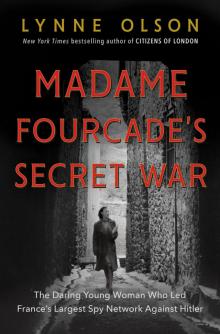 Madame Fourcade's Secret War
Madame Fourcade's Secret War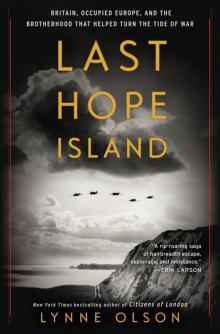 Last Hope Island
Last Hope Island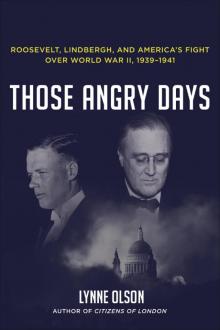 Those Angry Days
Those Angry Days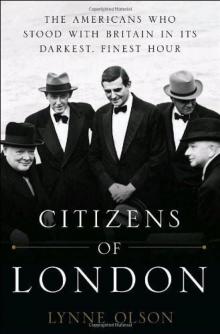 Citizens of London
Citizens of London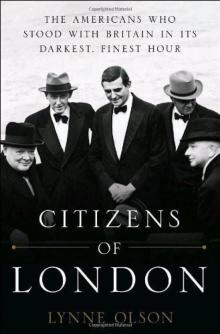 Citizens of London: The Americans Who Stood With Britain in Its Darkest, Finest Hour
Citizens of London: The Americans Who Stood With Britain in Its Darkest, Finest Hour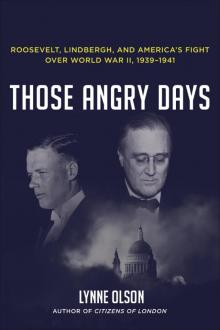 Those Angry Days: Roosevelt, Lindbergh, and America's Fight Over World War II, 1939-1941
Those Angry Days: Roosevelt, Lindbergh, and America's Fight Over World War II, 1939-1941